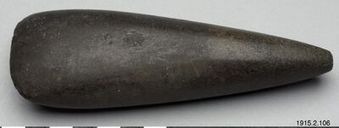Connect with Finnish Heritage Agency
Contact this content partner to get more information about this item.
stony
- Description:
- Physical description: Main list: A grafted stone ax (emóa) is also used as a hoe or better as a scaffold (e.g. a canoe when it is assembled). The stone blade is first tightened by a stapled ring between two wooden hairs of a skipper, which are then inserted into a tuft stapled from the rattan at the hook end of the stem. The double coat of arms can be rotated when it is sturdy so that the weapon becomes an ax or a telso as necessary. Telso. Telso has a long wooden stalk with a so-called. shoulder, i.e. it is made of a branch. There are perhaps darkness from fire in the stem. The blade is a smooth ground stone planted in an apparently split branch and attached to a tuft braided from the slats of a rattan palm. The Adze head head set in the cottage and stone with a twined sheath of splint stroller.
- Format:
- image
- Collections:
- Finnish Heritage Agency
- Content partner:
- Finnish Heritage Agency
- Availability:
- Not specified
-
Copyright status: Share, modifyFind out more about what you are able to do with this itemMore informationFinnish Heritage Agency has this to say about the rights status of this item:
http://creativecommons.org/licenses/by/4.0/
What can I do with this item?Non-infringing useNZ copyright law does not prevent every use of a copyright work, and this item may be hosted by an international institute or organisation. You should consider what you can and cannot do with a copyright work.Share itThis item is suitable for copying and sharing with others, without further permission.Modify itThis item is suitable for modifying, remixing and building upon, without further permission.Check about commercial useYou'll need to confirm with the copyright holder using this item for commercial purposes.
Welcome and warm Pasifik greetings
The information on this site has been gathered from our content partners.
The names, terms, and labels that we present on the site may contain images or voices of deceased persons and may also reflect the bias, norms, and perspective of the period of time in which they were created. We accept that these may not be appropriate today.
If you have any concerns or questions about an item, please contact us.
